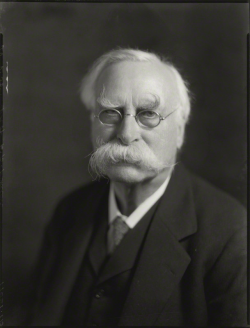Sir Edward Bagnall Poulton

- Born
- 27 January 1956
Sir Edward Bagnall Poulton was a naturalist and the first to recognise frequency-dependent natural selection. The theory of evolution by natural selection had just been introduced to the world by Charles Darwin, but few allowed it to flourish. In fact, there was a large amount of opposition to the theory. Sir Poulton however was a strong advocate of it, even while other prominent scientists doubted it strongly and openly.
Sir Poulton had suffered the cruelty of nature firsthand, having outlived three of his five children. Incidentally, it was the death of Charles Darwin’s daughter that spurred his emotional drive behind his theory of evolution, and the same could be said for Sir Poulton.
Poulton not only admired Darwin and his theories, but also the theories of another influential scientist named August Weismann, who came up with the idea of germ-plasm. Germ-plasm is the concept of maintaining a genetic lineage, e.g. selective animal breeding. He had a significant helping hand in translating the works of Weismann into English, making it accessible to millions more people and so spreading his ideas and encouraging important discussion around the topic.
While his loyalty was admirable, it would seem wrong to mention everybody else’s work without talking about the work of Poulton. He made his own incredible contributions to our knowledge which made him a reliable voice in the scientific community. His book, The Colours of Animals, brought many new ideas into the field of biology. He described the concepts of frequency-dependent selection and aposematism (warning colours in animals). He also coined the term “sympatric” in regards to species. All of these ideas and theories are still relevant today and helped moved biology forwards in big important steps.
Throughout his whole life Poulton was completely dedicated to Oxford University, having studied there between 1873 and 1876 and then becoming a lecturer, scholar, and Fellow for the institution until his death in 1898. He was awarded with a number of honours for his work and influence, including being elected as a Fellow of the Royal Society and receiving the Royal Society’s Darwin Medal.



